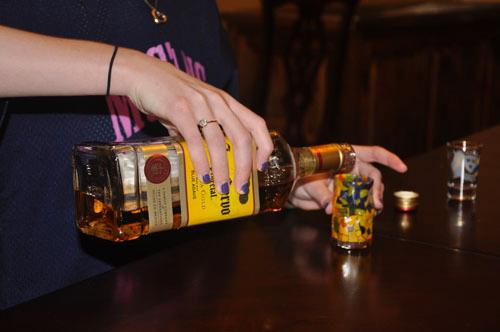
Some students work as bartenders to make money after school hours. (Rebecca Keay / The Daily Campus)
Many students looking for jobs that don’t require a college degree but still pay well have found that the service industry in Dallas, particularly bartending and working as wait staff, can be a gold mine.
Working as a bartender or server can bring in big tips each night. The job, with its high pay and night hours, makes it a good way to make ends meet while still being able to take college courses during the day.
Maggie Garza takes classes at Brookhaven College in Dallas and also works at The Rosewood Mansion on Turtle Creek. Garza pays her full college tuition with the money she makes working.
“On average I make $250 to $300 in tips a night and I’d say one third of the money I make goes to paying my college tuition,” Garza said.
With more than 6,620 results on Yelp for bars in Uptown Dallas and alcohol sales over $1 billion in North Texas, this industry is a significant part of the Dallas-Ft.Worth economy.
The uptown area is home to some of the most exclusive food establishments around.
With the slow economy and a tighter pool of financial aid for students, working to pay for higher education is common. According to a College Board report, to attend an in-state public college for the 2012-13 academic year, the average overall cost for students who don’t receive any financial aid rose 3.8 percent to a record $22,261. A job in the food and alcohol business can defray those costs, students said.
However, there are also disadvantages.
“We work really late hours and sometimes our come-in hours are really close to when we get out of school, but besides that it’s more me having to be here so late at night versus if I worked another job I could get off and study. [I] get off and go to bed so I can get up for school,” Garza said.
Dallas resident Jacob Russo is perusing his career in acting. Before he got his start in his career, he held many part time bartending jobs in the uptown Dallas area and paid his college tuition from his salary.
“I wouldn’t have been as good at acting if it weren’t for my bartending experiences. I really got to learn how to adapt to different situations. I dealt with some tough clients,” Russo said.
Working as a bartender or server allows you to attend class during the day and work at night, when bars typically tend to bring in most of their clients.
“The night scene is big in Dallas,” said Russo. “I worked during the day on weekends but I made more in tips working at night because people get off work and go get drinks with colleagues and friends.”
Laura McGowan started bartending in high school. She takes classes at Eastfield College in Mesquite and works as a server at The Rosewood Mansion on Turtle Creek. Working at a bar is not something she plans to do forever.
“Through my bartending experience I realized this is something I don’t want to do for the rest of my life I really wanted to be in a professional career although some may consider this a professional career but one with more regular hours,” McGowan said.
McGowan said she enjoys working at The Rosewood Mansion on Turtle Creek because she only has to work 4 days a week, as opposed to some other places where you have to work 5 or 6 days a week to be considered a full time employee.
“Money is always a factor when applying for jobs, because you always want to make more money,” McGowan said.
Job security is another positive aspect of the business. Russo said he never had a hard time finding a bartending job.
“There are always new bars and restaurants opening up in the uptown area and everyone wants to be the first to go and try them out,” he said.
SMU student Charlotte Calhoun has worked in the restaurant industry for about a year now. She is currently a hostess at the Mansion on Turtle Creek and said she can think of at least 15 people off the top of her head that are working their way through college as bartenders.
“I don’t have to pay my college tuition but I do have to pay for the cost of living and other needs, said Calhoun. “However, I know plenty of people I have met through my industry network that rely on tips to pay for college.”
For some people, holding a career as a bartender does not end after receiving a college degree. According to the U.S. Bureau of Labor Statistics, over 317,000 waiters and waitresses have college degrees (over 8,000 of them have doctoral or professional degrees), along with more than 80,000 bartenders.
It’s no surprise that some people would choose to work full time bartending when they could make $300 a night, roughly $1,500 in a 5-night per week shift, which would be about $78,000 a year.
But let’s not forget the opportunities bartending and serving salaries can provide for those looking to earn a college degree.
“If it weren’t for all my bartending jobs, I would have never been able to go to college,” Russo said.








